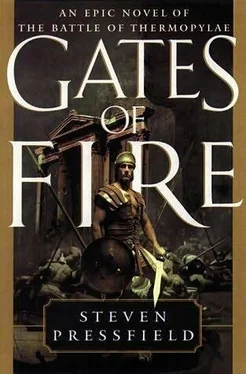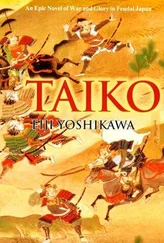Steven Pressfield - Gates of Fire - An Epic Novel of the Battle of Thermopylae
Здесь есть возможность читать онлайн «Steven Pressfield - Gates of Fire - An Epic Novel of the Battle of Thermopylae» весь текст электронной книги совершенно бесплатно (целиком полную версию без сокращений). В некоторых случаях можно слушать аудио, скачать через торрент в формате fb2 и присутствует краткое содержание. Жанр: Историческая проза, на английском языке. Описание произведения, (предисловие) а так же отзывы посетителей доступны на портале библиотеки ЛибКат.
- Название:Gates of Fire: An Epic Novel of the Battle of Thermopylae
- Автор:
- Жанр:
- Год:неизвестен
- ISBN:нет данных
- Рейтинг книги:3 / 5. Голосов: 1
-
Избранное:Добавить в избранное
- Отзывы:
-
Ваша оценка:
- 60
- 1
- 2
- 3
- 4
- 5
Gates of Fire: An Epic Novel of the Battle of Thermopylae: краткое содержание, описание и аннотация
Предлагаем к чтению аннотацию, описание, краткое содержание или предисловие (зависит от того, что написал сам автор книги «Gates of Fire: An Epic Novel of the Battle of Thermopylae»). Если вы не нашли необходимую информацию о книге — напишите в комментариях, мы постараемся отыскать её.
Gates of Fire: An Epic Novel of the Battle of Thermopylae — читать онлайн бесплатно полную книгу (весь текст) целиком
Ниже представлен текст книги, разбитый по страницам. Система сохранения места последней прочитанной страницы, позволяет с удобством читать онлайн бесплатно книгу «Gates of Fire: An Epic Novel of the Battle of Thermopylae», без необходимости каждый раз заново искать на чём Вы остановились. Поставьте закладку, и сможете в любой момент перейти на страницу, на которой закончили чтение.
Интервал:
Закладка:
Further, experience has taught us, Aristodemos added, that honor and glory are boons which cannot be granted by the pen but must be earned by the spear.
My glance scanned in this moment the faces of the allies. Tears stood in the eyes of not a few; others seemed so undone with relief that their knees threatened to give way beneath them. The Egyptian clearly discerned this. He smiled, gracious and patient, not abashed in the least.
Gentlemen, gentlemen. I trouble you with matters which should and must be debated, not here in the marketplace so to speak, but in private before your king. Please, if you will, conduct me to him.
He'll tell you the same, brother, Dienekes declared.
And in far cruder language, put in another Spartan among the crowd.
Tommie waited for the laughter to subside.
May I hear this response, then, from the king's own lips?
He'd have us whipped, Tommie, Dienekes put in with a smile.
He'd tear the hide off our backs, spoke the same man who had interposed a moment earlier, even to propose such a course of dishonor.
The Egyptian's eyes swung now to this speaker, whom he perceived to be an older Spartan, clad in tunic and homespun cloak, who now stepped into the second rank, at the shoulder of Aristodemos. For a moment the marine was taken aback to discover this graybeard, who clearly bore the weight of more than sixty summers, yet stood in infantryman's raiment among the other, far younger warriors.
Please, my friends, the Egyptian continued, do not respond out of pride or the passion of the moment but permit me to place before your king the wider consequences of such a decision. Let me set the Persian Majesty's ambitions in perspective.
Greece is just the jumping-off point. The Great King already rules all Asia; Europe now is his goat. From Hellas His Majesty's army moves on to conquer Sikelia and Italia, from there to Helvetia, Germania, Gallia, Iberia. With you on our side, what force can stand against us? We will advance in triumph to the Pillars of Herakles themselves and beyond, to the very walls of Oceanus!
Please, brothers, consider the alternatives. Stand now in pride of arms and be crushed, your country overrun, wives and children enslaved, the glory of Lakedaemon, not to say her very existence, effaced forever from the earth. Or elect, as I urge, the course of prudence. Assume with honor your rightful station in the forefront of the invincible tide of history. The lands you rule now will be as nothing beside the domains the Great King will bestow upon you. Join us, brothers. Conquer with us all the world! Xerxes son of Darius swears this: no nation or army will surpass you in honor among all His Majesty's forces! And if, my Spartan friends, the act of abandoning your Hellene brothers strikes you as dishonorable, King Xerxes extends his offer further, to all Greeks. All Hellenic allies, regardless of nation, will he set in freedom at your shoulder and honor second only to yourselves among his minions!
Neither Olympieus nor Aristodemos nor Dienekes nor Polynikes lifted voice in response. Instead the Egyptian saw them defer to the older man in the homespun cloak.
Among the Spartans any may speak, not just these ambassadors, as we are all accounted Peers and equals before the law. The elder now stepped forward. May I take the liberty to suggest, sir, an alternative course, which I feel certain will find favor, not among the Lakedaemonians alone, but with all the Greek allies?
Please do, responded the Egyptian.
All eyes centered upon the veteran.
Let Xerxes surrender to us, he proposed. We will not fail to match his generosity, but set him and his forces foremost among our allies and grant to him all the honors which he so munificently proposes to shower upon us.
A laugh burst from the Egyptian.
Please, gentlemen, we squander precious time. He turned away from the older man, not without a hint of impatience, and pressed his request again to Olympieus. Conduct me at once to your king.
No use, friend, answered Polynikes.
The king is a crusty old bugger, Dienekes added.
Indeed, put in the older man. He is a foul-tempered and irascible fellow, barely literate, in his cups most days before noon, they say.
A smile now spread across the features of the Egyptian. He glanced to my master and to Olympieus. I see, said Tommie.
His look returned to the older man, who, as the Egyptian now discerned, was none other than Leonidas himself.
Well then, venerable sir, Tommie addressed the Spartan king directly, dipping his brow in a gesture of respect, since it seems I am to be frustrated in my desire to speak in person with Leonidas, perhaps, in deference to the gray I behold in your beard and the many wounds my eyes espy upon your body, you yourself, sir, will accept this gift from Xerxes son of Darius in your king's stead.
From a pouch the Egyptian produced a double-handled goblet of gold, magnificent in craftsmanship and encrusted with precious gems. He declared that the engravings thereupon represented the hero Amphiktyon, to whom the precinct of Thermopylae was sacred, along with Herakles and Hyllus, his son, from whom the race of the Spartans, and Leonidas himself, was descended. The cup was so heavy that the Egyptian had to hold it out with both hands.
If I accept this generous gift, Leonidas addressed him, it must go into the war treasury of the allies.
As you wish. The Egyptian bowed.
Then convey the Hellenes' gratitude to your King. And tell him my offer will remain open, should God grant him the wisdom to embrace it.
Tommie passed the goblet to Aristodemos, who accepted it for the king. A moment passed, in which the Egyptian's eyes met first Olympieus', then settled gravely upon my master's. An expression of solemnity, sober to the point of sorrow, shrouded the marine's eyes. Clearly he discerned now the inevitability of that which he had sought with such charity and concern to avert.
If you fall in capture, he addressed the Spartans, call my name. I will exert every measure of influence to see that you are spared.
You do that, brother, Polynikes answered, hard as steel.
The Egyptian recoiled, stung. Dienekes stepped in swiftly, clasping the marine's hand warmly in his own.
Till we meet, Dienekes said.
Till then, Tommie replied.
Book Six. Dienekes
Chapter Twenty Four
They wore trousers. Pantaloons of purple, bloused below the knee, top-ping calf-length boots of doeskin or some other precious product of the tannery. Their tunics were sleeved and embroidered, beneath mail jackets of armor shaped like fish scales; their helmets open-faced and brilliantly plumed, of hammered iron shaped like domes. Their cheeks they wore rouged and their ears and throats bedecked with ornament. They looked like women and yet the effect of their raiment, surreal to Hellene eyes, was not that which evoked contempt, but terror- One felt as if he were facing men from the underworld, from some impossible country beyond Oceanus where up was down and night day. Did they know something the Greeks didn't? Were their light skirmisher shields, which seemed almost ludicrously flimsy contrasted to the massive twentypound oak and bronze, shoulder-to-knee aspides of the Hellenes, somehow, in some undivinable way, superior? Their lances were not the stout ash and cornelwood eight-footers of the Greeks but lighter, slender, almost javelin-like weapons. How would they strike with these? Would they hurl them or thrust them underhand? Was this somehow more lethal than the overhand employed by the Greeks? They were Medes, the vanguard division of the troops who would first assault the allies, though none among the defenders knew this for certain at the time. The Greeks could not distinguish among Persians, Medes, Assyrians, Babylonians, Arabians, Phrygians, Karians, Armenians, Cissians, Cappadocians, Paphlagonians, Bactrians nor any of the other five score Asiatic nations save the Ionian Hellenes and Lydi-ans, the Indians and Ethiopians and Egyptians who stood out by their distinctive arms and armor. Common sense and sound generalship dictated that the commanders of the Empire grant to one nation among their forces the honor of drawing first blood. It made further sense, so the Greeks surmised, that when making trial of an enemy for the first time, a prudent general would not commit the flower of his troops-in His Majesty's case his own Ten Thousand, the Persian household guard known as the Immortals-but rather hold these elite in reserve against the unexpected.
Читать дальшеИнтервал:
Закладка:
Похожие книги на «Gates of Fire: An Epic Novel of the Battle of Thermopylae»
Представляем Вашему вниманию похожие книги на «Gates of Fire: An Epic Novel of the Battle of Thermopylae» списком для выбора. Мы отобрали схожую по названию и смыслу литературу в надежде предоставить читателям больше вариантов отыскать новые, интересные, ещё непрочитанные произведения.
Обсуждение, отзывы о книге «Gates of Fire: An Epic Novel of the Battle of Thermopylae» и просто собственные мнения читателей. Оставьте ваши комментарии, напишите, что Вы думаете о произведении, его смысле или главных героях. Укажите что конкретно понравилось, а что нет, и почему Вы так считаете.












